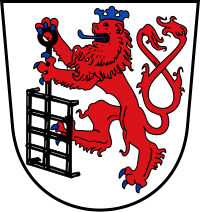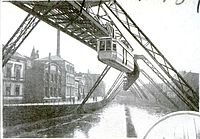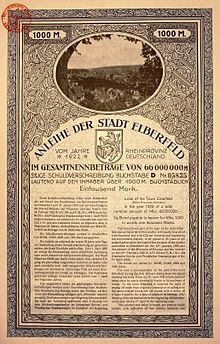Elberfeld: Difference between revisions
→top: USA is deprecated per MOS:NOTUSA; genfixes, and also some correction of overlinking of United States |
|||
| (30 intermediate revisions by 26 users not shown) | |||
| Line 1: | Line 1: | ||
{{Short description|Municipality in Germany}} |
|||
| ⚫ | |||
{{More citations needed|date=February 2016}} |
{{More citations needed|date=February 2016}} |
||
{{Expand German|date=July 2011|Elberfeld}} |
{{Expand German|topic=geo|date=July 2011|Elberfeld}} |
||
| ⚫ | |||
[[File:DEU Elberfeld COA.svg|thumb|200px|[[Coat of arms]]]] |
[[File:DEU Elberfeld COA.svg|thumb|200px|[[Coat of arms]]]] |
||
[[File:Elberfeld suspension railway.jpg|thumb|200px|The suspension railway of Elberfeld was built over the |
[[File:Elberfeld suspension railway.jpg|thumb|200px|The suspension railway of Elberfeld was built over the river in order to keep the streets unobstructed.]][[File:Elberfeld 1899.jpg|thumb|200px|Elberfeld ca. 1899]] |
||
[[File:Stadt Elberfeld 1922.JPG|thumb|Bond of the former town Elberfeld, issued 1. March 1922]] |
[[File:Stadt Elberfeld 1922.JPG|thumb|Bond of the former town Elberfeld, issued 1. March 1922]] |
||
| Line 9: | Line 10: | ||
==History== |
==History== |
||
The first official mentioning of the geographic area on the banks of today's [[Wupper]] River as "''elverfelde''" was in a document of 1161. |
The first official mentioning of the geographic area on the banks of today's [[Wupper]] River as "''elverfelde''" was in a document of 1161. Etymologically, ''elver'' is derived from the old [[Low German]] word for "river." (See etymology of the name of the German [[Elbe#Etymology|Elbe]] River; cf. [[North Germanic languages|North Germanic]] ''älv''.) Therefore, the original meaning of "elverfelde" can be understood as "field on the river." Elverfelde received its town charter in 1610. |
||
In 1726 |
In 1726, Elias Eller and a pastor, Daniel Schleyermacher, founded a [[Philadelphian Society]]. They later moved to [[Ronsdorf]] in the [[Duchy of Berg]], becoming the [[Zionites (Germany)|Zionites]], a fringe sect. |
||
The 1820s saw the commencement of the [[Plymouth Brethren]] in Dublin, Ireland. This evangelical religious movement spread to the Continent and emerged in Germany chiefly out of [[Pietist]] groups through the work of [[Julius Anton von Poseck]], William Henry Darby and [[Carl Brockhaus]]. By the 1850s the resultant group had a focal point in Elberfeld and are known to the present as the ''Elberfelder Brethren''. They have branches throughout Germany and Switzerland and beyond. A translation of the Bible into German was produced by this group and is known as the [[Darby Bible#German translation|Elberfelder Bibel]]''. |
|||
In 1826 [[Friedrich Harkort]], a famous German industrialist and politician, had a type of suspension railway built as a trial and ran it on the grounds of what is today the tax office at Elberfeld. In fact the railway, the [[Schwebebahn Wuppertal]], was eventually built between Oberbarmen and Vohwinkel and runs through Elberfeld. |
In 1826 [[Friedrich Harkort]], a famous German industrialist and politician, had a type of suspension railway built as a trial and ran it on the grounds of what is today the tax office at Elberfeld. In fact the railway, the [[Schwebebahn Wuppertal]], was eventually built between Oberbarmen and Vohwinkel and runs through Elberfeld. |
||
| Line 19: | Line 18: | ||
In 1888 the district of Sonnborn was incorporated into Elberfeld. In 1929 the towns of [[Barmen]], Elberfeld, Vohwinkel, [[Cronenberg, Wuppertal|Cronenberg]] and Ronsdorf became a municipal entity officially called "Barmen-Elberfeld;" in the same year, the unified city administration through a vote of its council members decided to rename the newly incorporated city "Wuppertal." This took place in 1930. Today Elberfeld is the largest municipal subdivision of Wuppertal. |
In 1888 the district of Sonnborn was incorporated into Elberfeld. In 1929 the towns of [[Barmen]], Elberfeld, Vohwinkel, [[Cronenberg, Wuppertal|Cronenberg]] and Ronsdorf became a municipal entity officially called "Barmen-Elberfeld;" in the same year, the unified city administration through a vote of its council members decided to rename the newly incorporated city "Wuppertal." This took place in 1930. Today Elberfeld is the largest municipal subdivision of Wuppertal. |
||
==Notable |
==Notable people== |
||
*[[Greta Bösel]] (1908–1947), concentration camp guard executed for war crimes |
*[[Greta Bösel]] (1908–1947), concentration camp guard executed for war crimes |
||
*[[Arno Breker]], sculptor |
*[[Arno Breker]], sculptor |
||
*[[Heinz Thilo]], SS war criminal |
|||
*[[Werner Eggerath]], [[German Democratic Republic|East German]] politician |
*[[Werner Eggerath]], [[German Democratic Republic|East German]] politician |
||
*[[Karl Germer]], Outer Head of |
*[[Karl Germer]], Outer Head of [[Ordo Templi Orientis]] (1947–1962) |
||
*[[Will Glahé]], accordionist, composer, and bandleader |
*[[Will Glahé]], accordionist, composer, and bandleader |
||
*[[Carl Grossberg]], artist |
*[[Carl Grossberg]], artist |
||
*[[Theodor Hausmann]] (1880–1972), composer |
|||
*[[August von der Heydt]] (1801–1874), economist |
|||
*[[Eduard von der Heydt]] (1882–1964), banker |
|||
*[[Walter Kaufmann (physicist)]], physicist |
*[[Walter Kaufmann (physicist)]], physicist |
||
*[[Hans Knappertsbusch]], conductor |
*[[Hans Knappertsbusch]], conductor |
||
*[[Erich Koch]], |
*[[Erich Koch]], [[Nazi Party]] Gauleiter of East Prussia, Reichskommissar of Ukraine, convicted war criminal |
||
*[[Hermann Friedrich Kohlbrugge]], minister |
*[[Hermann Friedrich Kohlbrugge]], minister |
||
*[[Friedrich Wilhelm Krummacher]], minister |
*[[Friedrich Wilhelm Krummacher]], minister |
||
*[[Johann Peter Lange]], Protestant theologian |
*[[Johann Peter Lange]], Protestant theologian |
||
*[[Else Lasker-Schüler]], poet |
*[[Else Lasker-Schüler]] (1869–1945), poet |
||
*[[Wilhelm Neumann-Torborg]], sculptor<ref name="Beitrage">{{cite web|title=Beiträge zur Geschichte und Heimatkunde des Wuppertals, Volumes 12-18 |
*[[Wilhelm Neumann-Torborg]], sculptor<ref name="Beitrage">{{cite web|date=1966|title=Beiträge zur Geschichte und Heimatkunde des Wuppertals, Volumes 12-18|url=https://books.google.com/books?id=q80_AQAAIAAJ&q|access-date=30 November 2015|language=de}}</ref> |
||
*[[Friedrich Philippi (historian)|Friedrich Philippi]], historian |
*[[Friedrich Philippi (historian)|Friedrich Philippi]], historian |
||
*[[Julius |
*[[Julius Plücker]], mathematician and physicist |
||
*[[Eugene Plumacher]] (1838–1910), emigrant to the United States, diplomat |
|||
*[[Sigurd Raschèr]], saxophonist |
*[[Sigurd Raschèr]], saxophonist |
||
*[[Paul Ortwin Rave]], art historian and director of the Berlin National Gallery |
|||
*[[Fritz Roeber]] (1851–1924), painter |
|||
*Sir [[Hans Wolfgang Singer]], economist |
*Sir [[Hans Wolfgang Singer]], economist |
||
*[[Johannes Steele]] (1908–1988), journalist |
|||
*[[Horst Stein]], conductor |
|||
*[[Horst |
*[[Horst Stein]] (1901–1989), conductor |
||
*[[Horst Tappert]] (1923–2008), actor |
|||
| ⚫ | |||
*[[Edward Thonen]] (1827-1854), emigrant to Australia, leader of [[Eureka Rebellion]] |
|||
| ⚫ | |||
| ⚫ | |||
| ⚫ | |||
*[[Sulamith Wülfing]], artist |
*[[Sulamith Wülfing]], artist |
||
| Line 57: | Line 65: | ||
[[Category:Wuppertal]] |
[[Category:Wuppertal]] |
||
[[Category:Former municipalities in North Rhine-Westphalia]] |
[[Category:Former municipalities in North Rhine-Westphalia]] |
||
[[Category:Rhine Province]] |
[[Category:Districts of the Rhine Province]] |
||
Latest revision as of 05:57, 23 July 2024
This article needs additional citations for verification. (February 2016) |
You can help expand this article with text translated from the corresponding article in German. (July 2011) Click [show] for important translation instructions.
|




Elberfeld is a municipal subdivision of the German city of Wuppertal; it was an independent town until 1929.
History
[edit]The first official mentioning of the geographic area on the banks of today's Wupper River as "elverfelde" was in a document of 1161. Etymologically, elver is derived from the old Low German word for "river." (See etymology of the name of the German Elbe River; cf. North Germanic älv.) Therefore, the original meaning of "elverfelde" can be understood as "field on the river." Elverfelde received its town charter in 1610.
In 1726, Elias Eller and a pastor, Daniel Schleyermacher, founded a Philadelphian Society. They later moved to Ronsdorf in the Duchy of Berg, becoming the Zionites, a fringe sect.
In 1826 Friedrich Harkort, a famous German industrialist and politician, had a type of suspension railway built as a trial and ran it on the grounds of what is today the tax office at Elberfeld. In fact the railway, the Schwebebahn Wuppertal, was eventually built between Oberbarmen and Vohwinkel and runs through Elberfeld.
In 1888 the district of Sonnborn was incorporated into Elberfeld. In 1929 the towns of Barmen, Elberfeld, Vohwinkel, Cronenberg and Ronsdorf became a municipal entity officially called "Barmen-Elberfeld;" in the same year, the unified city administration through a vote of its council members decided to rename the newly incorporated city "Wuppertal." This took place in 1930. Today Elberfeld is the largest municipal subdivision of Wuppertal.
Notable people
[edit]- Greta Bösel (1908–1947), concentration camp guard executed for war crimes
- Arno Breker, sculptor
- Heinz Thilo, SS war criminal
- Werner Eggerath, East German politician
- Karl Germer, Outer Head of Ordo Templi Orientis (1947–1962)
- Will Glahé, accordionist, composer, and bandleader
- Carl Grossberg, artist
- Theodor Hausmann (1880–1972), composer
- August von der Heydt (1801–1874), economist
- Eduard von der Heydt (1882–1964), banker
- Walter Kaufmann (physicist), physicist
- Hans Knappertsbusch, conductor
- Erich Koch, Nazi Party Gauleiter of East Prussia, Reichskommissar of Ukraine, convicted war criminal
- Hermann Friedrich Kohlbrugge, minister
- Friedrich Wilhelm Krummacher, minister
- Johann Peter Lange, Protestant theologian
- Else Lasker-Schüler (1869–1945), poet
- Wilhelm Neumann-Torborg, sculptor[1]
- Friedrich Philippi, historian
- Julius Plücker, mathematician and physicist
- Eugene Plumacher (1838–1910), emigrant to the United States, diplomat
- Sigurd Raschèr, saxophonist
- Paul Ortwin Rave, art historian and director of the Berlin National Gallery
- Fritz Roeber (1851–1924), painter
- Sir Hans Wolfgang Singer, economist
- Johannes Steele (1908–1988), journalist
- Horst Stein (1901–1989), conductor
- Horst Tappert (1923–2008), actor
- Edward Thonen (1827-1854), emigrant to Australia, leader of Eureka Rebellion
- Günter Wand (1912–2002), conductor
- Carl Wirths (1897–1955), politician
- Sulamith Wülfing, artist
See also
[edit]51°16′N 7°08′E / 51.267°N 7.133°E
References
[edit]- ^ "Beiträge zur Geschichte und Heimatkunde des Wuppertals, Volumes 12-18" (in German). 1966. Retrieved 30 November 2015.
